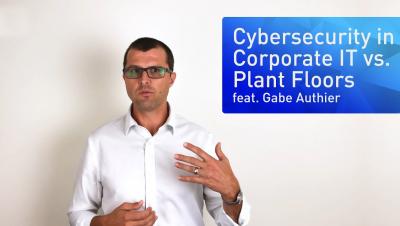Security | Threat Detection | Cyberattacks | DevSecOps | Compliance
August 2019
Top PayPal Scams and Protection Tips
This article will give you insights into the common PayPal hoaxes circulating these days. Additionally, you will learn how to keep your payment experience safe when using the popular service in question.
Cybersecurity for Industrial Control Systems (ICS) with Tripwire
Visibility for Industrial Networks: Active vs. Passive Monitoring
Insider Threats: Root Causes and Mitigation Practices
The recent IBM 2019 Cost of Data Breach survey found that the cost of a data breach had risen 12% over the past 5 years to $3.92 million on average. While 51% of the data breach attacks were attributed to malicious or criminal actors, a stunning 24% of the breaches were caused by negligent employees or contractors. The report also notesed that the 51% of the criminal actors included, “malware infections, criminal insiders, phishing/social engineering and SQL injection.”
Disruption: The True Cost of an Industrial Cyber Security Incident
Industrial control systems are essential to the smooth operation of various national critical infrastructure. While once segmented from the web, these systems are now becoming increasingly more networked and remotely accessible as organizations transform to meet the digital age. This development potentially exposes industrial control systems to digital threats.
Canada's Recommendations for Upholding Digital Security in the Financial Sector
On 29 July 2019, Capital One disclosed a digital security incident in which an outside individual gained unauthorized access to its systems. That party then leveraged their access to obtain the personal and financial information of Capital One cardholders as well as of individuals who at one point applied for a credit card. Overall, the bank holding company estimated that the breach affected 100 million Americans as well as six million Canadians.
IBM Study Shows Data Breach Costs on the Rise
For the 14th consecutive year, IBM Security released its annual Data Breach Report that examines the financial impact of data breaches on organizations. According to the report, the cost of a data breach has risen 12% over the past 5 years to $3.92 million per incident on average. These rising expenses are representative of the multi-year financial impact of breaches, increased regulation and the complex process of resolving criminal attacks.
Block newly-registered domains to reduce security threats in your organisation
It’s no secret that there are a lot of websites on the internet hosting malicious content whether they be phishing pages, scams or malware itself. Every day we hear of new attacks, there’s a common denominator of either a user having clicked on a link to a fraudulent website or a site having played host to code that pulled a malicious payload down from a third-party server.
Industrial Cybersecurity in Corporate IT vs. Plant Floors
Survey: 84% of Security Pros Said Their Organizations Struggled to Maintain Security Configurations in the Cloud
Headlines continue to suggest that organizations’ cloud environments make for tantalizing targets for digital attackers. Illustrating this point, the 2019 SANS State of Cloud Security survey found “a significant increase in unauthorized access by outsiders into cloud environments or to cloud assets” between 2017 (12 percent) and 2018 (19 percent). These findings beg the question: how prepared are organizations to defend themselves against cloud-based threats?
Embrace the Chaos: An Emerging Trend in Software Engineering?
What if your job was to break things repeatedly in order to make them work better? Sounds like the dream of every curious six-year old, but it’s actually an emerging software engineering trend based in the transition from devops to devsecops. It’s designed to test systematic limitations with the goal of improving security and performance under any circumstances. The term is chaos engineering.
What is the MITRE ATT&CK Framework?
Being a CISO Isn't Just About Information Security - It's About Building a Stronger Business Strategy
Gone are the days when being a CISO (or even just ‘the security guy’) was about actual information security or IT security. Even the term IT security is outdated now, as it emphasizes a one-dimensional view of what security is really about. However, I digress…
Forensics in the Cloud: What You Need to Know
Cloud computing has transformed the IT industry, as services can now be deployed in a fraction of the time that it used to take. Scalable computing solutions have spawned large cloud computing companies such as Amazon Web Services (AWS), Google Cloud and Microsoft Azure.
Climbing the Vulnerability Management Mountain: Taking the First Steps Towards Enlightenment
Just as you would map a hike or climb by creating waypoints you plan to hit each day, you must plan your vulnerability management process by creating similar goals. We call these goals Maturity Levels, from ML0 to ML5, as we defined them in the last blog. You have your asset inventory from an open-source tool, asset tracking database or maybe your preferred vulnerability assessment tool. Now it is time to climb to the first waypoint ML0.
Psychological Tricks of the Malware Trade
As a Professional Services Consultant, I have the pleasure of traveling all around the globe meeting clients and talking to a wide variety of IT security professionals who form the front line of defence against malware. One of my favorite topics is how people got their start in their careers in IT, but when I start discussing my own early years and touch upon my university studies, I’m often surprised by the number of people who do a double take when I share my chosen subject.
Protecting Modern IoMT Against Cybersecurity Challenges
Even though the healthcare industry has been slower to adopt Internet of Things technologies than other industries, the Internet of Medical Things (IoMT) is destined to transform how we keep people safe and healthy, especially as the demand for lowering healthcare costs increases. The Internet of Medical Things refers to the connected system of medical devices and applications that collect data that is then provided to healthcare IT systems through online computer networks.
More than a million people have their biometric data exposed in massive security breach
A biometrics system used to secure more than 1.5 million locations around the world – including banks, police forces, and defence companies in the United States, UK, India, Japan, and the UAE – has suffered a major data breach, exposing a huge number of records. South Korean firm Suprema runs the web-based biometric access platform BioStar 2, but left the fingerprints and facial recognition data of more than one million people exposed on a publicly accessible database.
IoT Devices - Why Risk Assessment is Critical to Cybersecurity
As technology continues to pervade modern-day society, security and trust have become significant concerns. This is particularly due to the plethora of cyber attacks that target organizations, governments and society. The traditional approach to address such challenges has been to conduct cybersecurity risk assessments that seek to identify critical assets, the threats they face, the likelihood of a successful attack and the harm that may be caused.
What is NERC?
The North American Electic Reliability Corporation (NERC) is an international regulatory organization that works to reduce risks to power grid infrastructure. They do this through the continual development of a set of regulatory standards in addition to education, training, and certifications for industry personnel.
Black Hat USA 2019: Tripwire and the Evolution of Cybersecurity
CEO Cyber Quiz: What's Your IT Security IQ?
Every business leader understands that, when it comes to cybersecurity, the stakes are extraordinarily high. CEOs tend to take notice when they read headlines about yet another big-name company being victimized by a massive data breach or about industry forecasts suggesting that the annual cost of crime losses and damage will hit $6 trillion by 2021. However, does that mean top business leaders have meticulously prepared their organizations for a virtual worst-case scenario? The short answer: No.
How to Build a Mature Vulnerability Management Program
The evolution of the cyber threat landscape highlights the emerging need for organizations to strengthen their ability to identify, analyze and evaluate cyber risks before they evolve into full-fledged security incidents. When it comes to cyber risk mitigation, the terms “patch management” and “vulnerability management” are used as if they are interchangeable.
Ask the Experts: How Industrial Organizations Can Strengthen Their Security Posture
Many organizations are still struggling to fill out their digital security workforces. This task isn’t getting any easier with time, either. In a Tripwire-commissioned survey of 336 IT security professionals, four-fifths of respondents told Dimensional Research that they feel it’s gotten more difficult to hire skilled personnel since 2017.
Cryptocurrency exchange Binance offers $290,000 bounty to unmask blackmailer
Binance, one of the world’s largest cryptocurrency exchanges, has revealed that it is being blackmailed to the tune of 300 Bitcoin (approximately US $3.5 million) by someone who is threatening to release some 10,000 sensitive photographs of its customers. And in an attempt to identify its blackmailer, Binance has put a 25 Bitcoin (approximately US $290,000) bounty on their head.
Living the 7 Habits of Highly Effective Cybersecurity
The recent Tripwire blog ‘7 Habits of highly effective Vulnerability Management’ by Tim Erlin was a great read with some sage advice on the always relevant security topic of VM. I noticed, however, that although the seven points themselves were all Tim’s own, the title snappily paraphrased Steven Covey’s classic management book. This made me think.
Best Practices for IT Security Teams in the Age of Cloud
About a decade ago, organizations were hesitant to adopt cloud solutions, with many citing security concerns. Fast forward to 2019, and 81% of organizations have a multi-cloud strategy, spurred on by the desire for increased flexibility, usage-based spending and desire to respond to market opportunity with greater agility.
Staving Off the Monetary Consequences of a Data Breach
Cybersecurity breaches and regulatory compliance are this year’s themes. Marriott was sued and fined $124 million for their data breach back in 2014, according to The Wall Street Journal. Capital One leaked 100 million credit applications including Social Security Numbers. Both LabCorp and Quest Diagnostics exposed millions of patients’ medical records.
What Is Vulnerability Management and Why Does It Matter? ft. Zoë Rose
The Biggest Cyber Threat is Not A Zero-Day ft. Zoë Rose
A Day in the Life of an Ethical Hacker ft. Zoë Rose
Simple Security Configuration Can Help Your Sensitive Data From Being Stolen
When malware sneaks inside your network, it needs to communicate back to the internet whether to exfiltrate sensitive datasets it found, accept commands of its evil masters or even simply let them know it has successfully infiltrated your infrastructure (with ransomware being one of the rare exceptions that doesn’t need such connection).
The 2019 SANS Security Awareness Report: Awareness Training Is Rising
Cybersecurity and cyber security awareness are critical to business survival in an era dominated by growing virtual crime. It might be true that most people know about costly identity theft and reputation-destroying network hacks. Organizations spend millions every year trying to defend themselves against cybercrime, but still, attacks seem to be more and more successful.
Moving to the Cloud and How You Shift Your Security Management Strategy
As someone who has worked for their entire career in the Managed Network Services space, if I had to pick out, over the past five years, two of the most impactful shifts in managing technology, it would be a shift from traditional, in-house servers to solutions where 3rd parties build “clouds” to provide similar business functions as well as the increased pressure on organizations to have comprehensive cyber-security strategies as threats become more significant.
Exposed internal database reveals vulnerable unpatched systems at Honda
Automotive giant Honda has shut down an exposed database that contained sensitive information about the security — specifically the weak points — of its internal network. Security researcher Justin Paine discovered the sensitive information after scouring the internet with Shodan, a specialist search engine which can be used to find exposed internet-enabled devices such as webcams, routers and IP phones.
WaterISAC: 15 Security Fundamentals You Need to Know
Digital attacks targeting water facilities are on the rise. In its 2016 Data Breach Investigations Report, for instance, Verizon Enterprise disclosed an incident in which bad actors breached a water treatment plant and altered the levels of chemicals used to treat tap water at that facility. News of this incident came approximately two years after the ONWASA water facility revealed it had suffered a ransomware attack that had disrupted its internal computer system in the wake of Hurricane Florence.











